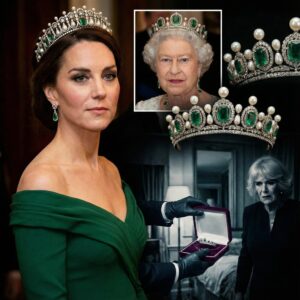In the high-octane world of NBC’s The Voice, where dreams are forged in the fire of four-chair turns and shattered by split-second decisions, few stages ignite as much raw emotion as the Knockouts. For 27 seasons, this pivotal round has been a coach’s chessboard—strategic pairings, heart-wrenching saves, and opportunistic steals turning potential eliminations into resurrection stories that fuel watercooler debates and viral montages. But as Season 28 barrels through its Knockout episodes, airing Mondays at 8 p.m. ET since the October 27 premiere, the format’s sacred cows have been led to slaughter. No more glowing Save buttons to snatch a star from the brink. No more Steal sirens blaring as rival coaches poach talent like vultures at a feast. In their place? A brutal binary: advance or vanish, with coaches wielding a solitary “Mic Drop” lifeline and artists empowered to chart their own perilous paths. The changes, unveiled amid the Battles’ dust settling, have plunged fans into a whirlwind of confusion and outrage, with social media erupting in threads like “What even is this anymore?” and “Bring back the steals—my heart can’t take these instant goodbyes!” Yet, buried in the backlash is a subversive shift: contestants now hold unprecedented sway over their fates, from song selection to self-pairing, transforming The Voice from a mentor’s game into a performer’s revolution. As the first Knockout night on October 27 delivered shocking eliminations—four per team, no mercy—these tweaks aren’t just rule bends; they’re a bold recalibration, testing whether raw talent can thrive without the safety nets of yesteryear.
To unpack this seismic shift, one must rewind to the show’s foundational frenzy. Launched in 2011 as a Dutch import reimagined for American appetites, The Voice exploded onto NBC with a simple, seductive premise: blind auditions stripping away superficiality, letting voices pierce the veil of celebrity judgment. Blake Shelton’s cowboy charm, Adam Levine’s Maroon 5 polish, and CeeLo Green’s eccentric flair set the tone, but it was the layered rounds—Blinds, Battles, Knockouts, Playoffs, Lives—that built an addictive architecture. The Knockouts, introduced in Season 3, elevated the drama: coaches pit three artists against each other in solo showcases, choosing one winner while scrambling for Saves (keeping a loser on the team) or Steals (swiping from others). It was chaos with a chaser—emotional, strategic, and endlessly replayable. A Save could resurrect a fan favorite like Season 10’s Chris Blue, whose gospel fire nearly flickered out before Alicia Keys hit the button. A Steal turned rivalries into raids, like John Legend poaching Maelyn Jarmon in Season 16, only for her to soar to victory. These mechanics weren’t just procedural; they were the show’s soul, humanizing coaches as flawed gamblers betting on underdogs. Viewership peaked at 18 million for Season 5’s finale, but by Season 27’s spring 2025 wrap—crowned by Michael Bublé’s mentee Huntley—the format showed fatigue, with critics griping about “save-spam” diluting stakes and predictable poaches padding runtimes.
Enter Season 28, a fall refreshmasterminded by NBCUniversal’s unscripted overlords, who eyed streaming rivals like The Masked Singer and American Idol with a mix of envy and innovation. Premiering September 22, 2025, under host Carson Daly’s steady hand, the cycle boasts a coach quartet blending fresh fire and seasoned swagger: Snoop Dogg, the laid-back rap sage returning from his Season 26 splash; Reba McEntire, the redheaded country colossus extending her streak; Michael Bublé, the Canadian crooner hungry for a third win; and Niall Horan, the ex-One Direction crooner chasing back-to-back triumphs. Absent are Adam Levine’s smirks, John Legend’s lore dumps, and Kelsea Ballerini’s budding bite, making way for a panel that’s equal parts hip-hop haze, twangy tenacity, and pop polish. From the jump, tweaks teased evolution: the “Carson Callback Card,” a golden ticket for Daly to revive a no-turn Blind reject, injected wildcard whimsy (used on October 6 to resurrect indie folkster Lila Voss). Battles flipped the script entirely—artists self-pair and self-select songs, ditching coach-orchestrated duels for organic matchups that birthed gems like Team Reba’s Aubrey Nicole and Zoe Mack’s soul-clash on Aretha Franklin’s “Respect.” Each coach snagged one Save and one Steal per round, but the real rupture loomed in the Knockouts: a leaner, meaner gauntlet designed to “let the cream rise without the crutch,” per executive producer Lee Metzger in a pre-season briefing.
The Knockouts’ blueprint for 2025 is a minimalist masterpiece—or a merciless meat grinder, depending on your Twitter feed. Gone are the trios of old; now, coaches pair their eight Battle survivors into four head-to-heads, with artists picking their own anthems to showcase unfiltered essence. No more coach-curated setlists forcing “My Way” on a rapper—contestants command the vibe, from Team Snoop’s Ralph Edwards belting Ed Sheeran’s “Dive” with gritty introspection to Team Niall’s Dustin Dale Gaspard channeling Teddy Swims’ “Lose Control” in velvet falsetto. Post-performance, the coach’s verdict is final: one advances to the Playoffs, the other evaporates—no Saves to soften the blow, no Steals to offer redemption arcs. It’s a stark departure from Season 27, where Bublé’s dual Saves kept three Knockout hopefuls afloat, sparking fan fervor but also “pity party” complaints. The elimination math is unforgiving: from 32 artists post-Battles to just 16 Playoff-bound, with four per team culled in a single, sweat-drenched night. To temper the terror, each coach wields one “Mic Drop” button—a glittering gimmick debuting October 27—that spotlights their standout performer for a fan-voted bonus advance. Hit it on a knockout king like Edwards, and America votes via the show’s app to potentially fast-track them past the Playoffs’ perils. “It’s the ultimate flex,” Snoop drawled during rehearsals, his purple chair swiveling with mischievous glee. “You drop that mic, and the people decide if your dog’s got bark.”
The October 27 premiere of Knockouts Night 1 was a bloodbath that validated the vertigo. Mega Mentors Zac Brown (for Teams Snoop and Bublé) and Joe Walsh (for Teams Reba and Niall) brought blue-collar bona fides and Eagles-era edge, coaching tweaks like Brown’s rasp-refining tips for Edwards or Walsh’s harmony hacks for Aubrey Nicole. Pairings popped with personality: Team Reba’s emotional showdown between Nicole’s powerhouse “Ain’t No Way” (Aretha redux) and Zoe Mack’s vulnerable “Gravity” (John Mayer melancholy), ending in Nicole’s tearful advance and Mack’s stunned silence. Team Snoop’s Ralph Edwards versus Kenny Iko on Sheeran’s “Dive” crackled—Edwards’ Valley-boy soul edging Iko’s silky R&B, prompting Snoop’s Mic Drop and a post-episode poll surge. Shocks abounded: Leyton Robinson’s folk-funk flair felled by Sadie Dahl’s country croon on Team Bublé, leaving fans howling “Steal her NOW!”—only to remember the button’s absence. Niall’s matchup of Ava Nat’s operatic “Halo” against a bluesy belter saw Nat soar, but the loser’s mic-drop farewell speech—a raw confessional on stage fright—drew 2 million X impressions in hours. By night’s end, eight artists advanced (Aubrey Nicole, Ralph Edwards, Ava Nat among them), but the four eliminations per team felt like guillotine drops, with no safety valves to cushion the falls. “These kids are gutting it out alone,” Bublé lamented backstage, his usual jazz-jive subdued. Reba, ever the steel magnolia, nodded: “No crutches means real cream rises.”
Fan confusion? It’s a Category 5 cyclone. Pre-season hype focused on Blinds and Battles, leaving Knockout novelties as unwelcome surprises. X lit up post-episode with 450,000 posts under #VoiceKnockouts, a 40% spike from Season 27’s equivalent. “Wait, NO STEALS? How do we get those comeback stories?!” tweeted @VoiceAddict87, her thread amassing 15,000 likes and replies decrying “instant heartbreak.” Reddit’s r/TheVoice subreddit, 250,000 strong, spawned a 5,000-upvote megathread: “Knocking out HALF the team with no recourse? This ain’t evolution, it’s execution.” TikTok stitches of eliminations—set to dramatic swells from “The Winner Takes It All”—racked 10 million views, users overlaying “RIP Steals 2011-2025” graphics. Some griped the Mic Drop as a “gimmicky band-aid,” arguing fan votes bias toward charisma over chops (citing Season 26’s viral but vocally middling acts). Others, like superfan podcaster Jessi Smiles, praised the purity: “Finally, no coach ego trips—it’s the artists’ show now.” Polls on the official app showed 62% “confused but intrigued,” with 28% threatening tune-outs. The bewilderment peaks around the artists’ agency: while Battle self-pairing was telegraphed, Knockout song sovereignty snuck up, leading to “wildcard” picks like a teen rapper tackling Patsy Cline that flummoxed coaches but thrilled TikTok. “They forgot to tell us the rules changed mid-game,” one viewer vented on Instagram Live, echoing a chorus of “Where’s the handbook?”
Yet, this overlooked empowerment is the round’s secret sauce, a democratizing jolt that could redefine The Voice‘s legacy. Artists choosing songs isn’t mere courtesy—it’s creative command, allowing performers to bare their souls sans coach-imposed molds. Take Ralph Edwards, the 30-year-old Fresno mechanic and single dad who’s auditioned 11 times: his “Dive” pick, a brooding confessional mirroring his life’s detours, wasn’t Snoop’s suggestion but his own gut punch, earning the Doggfather’s rare “it factor” rave. Or Aubrey Nicole, Team Reba’s soul siren, who swapped a safe ballad for Aretha’s firebrand “Ain’t No Way,” her ad-libbed runs a middle finger to genre boxes. This autonomy extends backward: Battle self-pairings birthed unlikely alliances, like Team Niall’s folk-punk duo turning “Lose Control” into a mosh-pit hymn. “It’s terrifying, but freeing,” Edwards shared in a post-Knockout interview, his callused hands fidgeting with his mic. “No more ‘sing what I say’—we own our narrative.” Coaches adapt warily: Snoop, the improvisational icon, thrives, freestyling pep talks; Bublé frets over “vocal risks” but admits the rawness rivals his early jazz dives. Reba, a veteran of volatile stages, sees echoes of her 1970s honky-tonks: “They pick the fight; we just judge the swing.” Horan, the youngest at 32, champions it outright: “Gives ’em skin in the game—watch the underdogs bite back.”
As Night 2 looms on November 3, with Playoffs teasing viewer-voted wildcards, Season 28’s Knockout gambit hangs in the balance. Early ratings? A 12% bump to 8.7 million viewers, per Nielsen, with Peacock streams surging 25% on elimination clips. Fan forums forecast a tighter finale—fewer “saved mediocrity,” more merit-based magic—but warn of burnout if the brutality bites too deep. Mega Mentors like Brown’s twangy tenacity and Walsh’s rock wisdom add mentorship muscle, prepping artists for unscripted spotlights. In a TV landscape bloated with second chances (Survivor‘s idols, Idol‘s restarts), The Voice‘s purge feels radical, a nod to real-world hustles where no one’s handing you a Steal. Confusion will fade into fervor if a self-chosen song crowns the champ—imagine Edwards, Mic Dropped to victory on a bayou ballad. For now, as confetti settles on fresh wounds, the message rings clear: in this voice, the singers shout loudest. Tune in Mondays—the revolution’s just warming up, and the mics? They’re dropping like never before.




